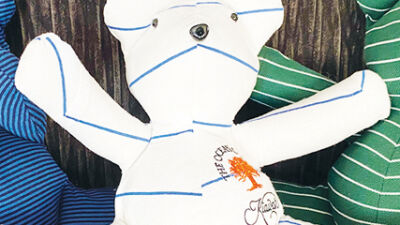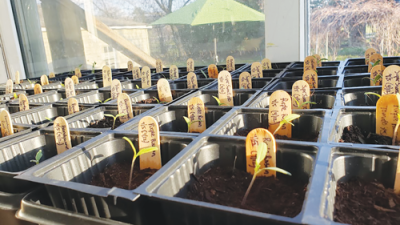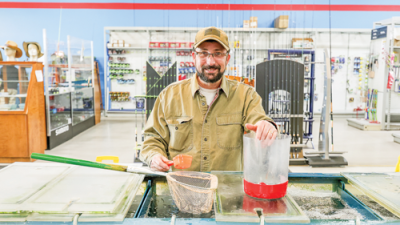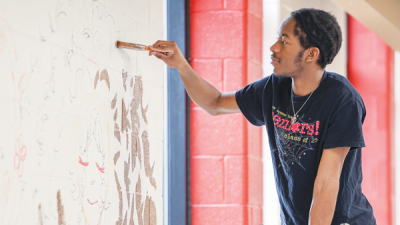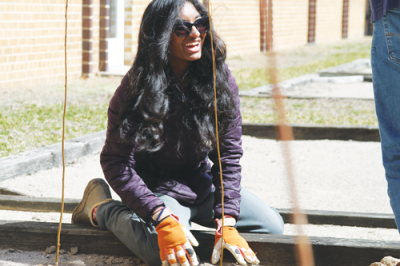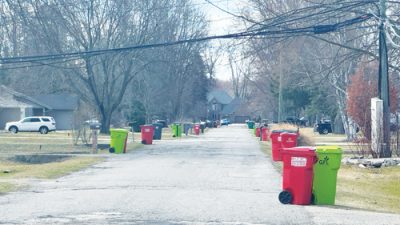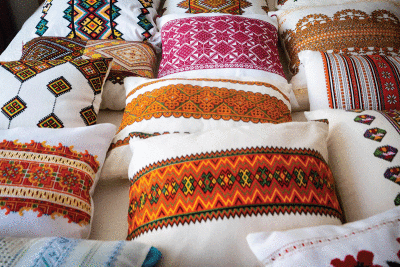
Pillows embroidered with different Ukrainian styles by Papiz are arranged on a bed in her Warren home.
Photo by Brian Wells
WARREN — “I like Ukrainian art,” Olena Papiz said with a smile from the couch of her Warren home. “Besides that, I like embroidery.”
Papiz was born March 22, 1923, in the village of Novosilka in western Ukraine. Growing up in the small village in the county of Pidhaitsi, she said, was full of hardship. To maintain her nationality under then-Polish occupation she was sent to private schools.
Papiz has lived through change and during wartime.
“It was not easy,” she said.
In 1941, when she was 18, she married Vasyl Papiz. Three years later, Russian forces came to Ukraine during World War II to fight the Germans. A group of 12 Russian soldiers lived in her house.
“I have to feed them, all of them, because they have no food,” she said.
She fed them potatoes and grain. They disappeared after about 14 days, she said, and a Ukrainian soldier told the couple if they didn’t leave, too, her husband would be shot or sent to Siberia. If she opposed the Russian government, she would be sent to Siberia, as well, she said.
They traveled around 375 miles west to Kosychi, where they were deported to Bavaria and on to Vienna, Austria.
“It was thousands and thousands of people running away from Communist government,” she said. “It was Ukrainian and Polish people, all kind was running away.”
They worked on a farm for a year before being taken to an American camp. There were 5,000 people in the camp, she said. The American forces made them stay there for five years while they tried to determine if they were collaborating with German forces or Russian spies.
After that, Papiz and her husband were asked if they had family in the United States. Papiz knew she had a cousin in Detroit, but she didn’t know the house number. Still, she wrote the letter, and it traveled around Detroit for five months before it finally made its way to her cousin. They exchanged a few letters before being told they could immigrate to the United States.
But before they could leave, a medical examination revealed that her husband was missing part of a lung, which he lost several years prior after catching pneumonia hiding from Russian forces. However, American doctors couldn’t figure out why he was missing part of his lung and they were worried it was tuberculosis.
Even though he told her she could go by herself, she waited. The couple eventually arrived in Boston together.
“And so, it was like that. We came to the United States in 1949, on the fifth of May,” Papiz said.
Several years after coming to Detroit, Papiz got together with groups of other Ukrainian women and began using her embroidery skills to make art in different Ukrainian styles. Different clothing she’s made adorn dolls and mannequins spread throughout her home, and her closets and dressers and wardrobes are full of embroidered art.
Papiz has worked with several branches of the Ukrainian National Women’s League of America to organize projects and displays. At the Ternopil Regional Art Museum in Ternopil, Ukraine, a display of her embroidery was removed and put into safe storage in various locations to be protected from the conflict that has ravaged the country in 2022.
A scholarship fund she created in the name of her husband, who died in 1990, has surpassed $30,000 in awards to orphans and Ukrainian students. In addition, her artwork has been sold at fundraisers to support Ukrainians in the current conflict.
Even though she’s lived in the United States for around three times longer than she lived in Ukraine, Papiz said, “My love for my country is natural.”
 Publication select ▼
Publication select ▼
